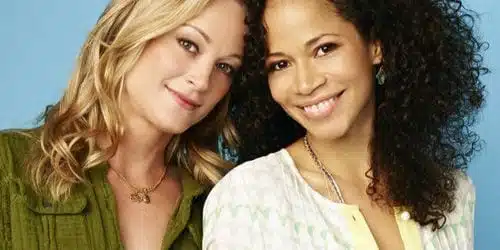
ABC Family’s The Fosters plants a muted rainbow flag in the sand. That planting is an especially earnest business: unlike Modern Family or The New Normal, shows that might disarm viewers who worry about the effects of non-nuclear families, The Fosters does not solicit laughs. Instead, it makes TV melodrama out of a family unit comprised of teenagers and their lesbian parents. As we look forward to television landscape where the trying-too-hard distinction between “new” and “old” normals isn’t needed, we might be inclined to cut this new take on the subject a bit of slack.
The first episode, airing 3 June, opens on Callie (Maia Mitchell), a girl who could be a baby-faced Disney alumna, a toughened-up Vanessa Hudgens or Demi Lovato, currently residing in a juvenile detention center. On the surface, she’s PG-13 mouthy and manipulative; in private, she’s more vulnerable. Her release from detention provides reason to sympathize with her: just before she emerges from a not-too-grim building, blinking in the sunlight, she receives a savage beating from a group of resentful fellow detainees.
Though an ostensibly ugly scene, the assault on Callie is shot in slow motion, images featuring swirling hair and faint, painted-on injuries. As cleaned-up as the fight may be, it makes the fact that she’s entering foster care look like a welcome change of circumstance. It also looks a bit disingenuous, as the household where she’s headed is so idyllic. This is not a show premised on social realism. It’s One Tree Hill with caseworkers and cops.
Callie’s new home is introduced by way of her new foster brother’s piano recital, attended by his devoted mother, Stef Foster (Teri Polo), without her partner Lena (Sherri Saum). This hints at drama to come, as the Fosters are in some state of duress even as their new foster child arrives: the family already includes two other adopted children and Lena is wary of bringing a potentially violent offender into the mix. Still, the first episode insists on their “normalcy,” in a couple of scenes revolving around mealtimes, complete with sibling spats and homework. We know what this means: imminent disaster.
This narrative clumsiness is compounded by heavy-handed metaphor in a later scene in which Stef’s biological son from a previous marriage, Brandon (David Lambert), takes pity on Callie when his siblings regard with her suspicion. As is often the case with male teenage characters on television, musical or literary talent is shorthand for unusual sensitivity. So, instead of having a conversation, he picks out notes on a piano keyboard to explain a personal piece of music to a sulky Callie, each representing a member of his family, coming together with the adoption of twins Jesus (Jake T. Austin) and Mariana (Cierra Ramirez). In his mind, and his music, they make a harmonious unit that “works better together.”
It’s less endearing that The Fosters indulges in rather overt manipulation concerning adoption and foster care politics. Filling out its cast with troubled teens exploits parental fears of violence, underage sex, and drugs ruthlessly as any Tea Party tract, even as these teens and their settings are very pretty. Though it’s not stylish, clever or shocking enough a drama to attract the ire of the American Family Association, The Fosters remains a little troubling. In its reductive suggestion that the Fosters are a good fit for Callie, whose incarceration arose from “trouble with male authority figures,” as well as her new foster parents’ blandly affectionate scenes together, the show is disappointingly skittish about making Stef and Lena anything other than benign, asexual guardian figures, rather than complex human beings.
There’s plenty of potential drama in the lives of both women: Stef and Lena are a likeable pair, holding down admirable, responsible jobs as a policewoman and the vice-principal of a school. They cope with casual homophobia, workplace strife, and errant children with equal grace. To undercut their apparent saintliness, the show offers a pleasing tension in their relationship with Brandon’s biological father, and the twins’ confusion relating to their own birth mother. Both of these subplots broach, superficially at least, the emotional and political complications of striving for color- culture-blindness in cross-racial adoptions.
Still, the Fosters feel less like a family than a careful assembly of machine-tooled parts, as if the show were engineered for a focus group approved “family drama” category. It suffers for being too tidily plotted, and a little too pleased with itself for its multiethnic and LGBT representations. But, The Fosters needs more than good intentions and tentative, sanitised handling of its subject to survive once a same-sex couple central to a US drama passes unnoticed.

